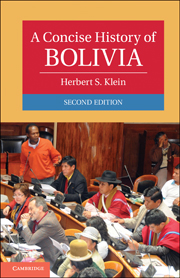Book contents
- Frontmatter
- Contents
- Preface to the Second Edition
- Preface to the First Edition
- 1 GEOGRAPHY AND PRE-COLUMBIAN CIVILIZATION
- 2 THE CREATION OF A COLONIAL SOCIETY
- 3 LATE COLONIAL SOCIETY: CRISIS AND GROWTH
- 4 REVOLUTION AND THE CREATION OF A NATION-STATE, 1809–1841
- 5 THE CRISIS OF THE STATE, 1841–1880
- 6 THE AGES OF SILVER AND TIN, 1880–1932
- 7 DISINTEGRATION OF THE ESTABLISHED ORDER, 1932–1952
- 8 FROM THE NATIONAL REVOLUTION TO THE COLD WAR, 1952–1982
- 9 CREATING A MULTIETHNIC DEMOCRACY, 1982–2002
- 10 THE EMERGENCE OF A MESTIZO AND INDIGENOUS ELITE, 2002–2010
- Political Chronology
- Tables
- Bibliography
- Index
- Titles in the series
Preface to the First Edition
Published online by Cambridge University Press: 01 June 2011
- Frontmatter
- Contents
- Preface to the Second Edition
- Preface to the First Edition
- 1 GEOGRAPHY AND PRE-COLUMBIAN CIVILIZATION
- 2 THE CREATION OF A COLONIAL SOCIETY
- 3 LATE COLONIAL SOCIETY: CRISIS AND GROWTH
- 4 REVOLUTION AND THE CREATION OF A NATION-STATE, 1809–1841
- 5 THE CRISIS OF THE STATE, 1841–1880
- 6 THE AGES OF SILVER AND TIN, 1880–1932
- 7 DISINTEGRATION OF THE ESTABLISHED ORDER, 1932–1952
- 8 FROM THE NATIONAL REVOLUTION TO THE COLD WAR, 1952–1982
- 9 CREATING A MULTIETHNIC DEMOCRACY, 1982–2002
- 10 THE EMERGENCE OF A MESTIZO AND INDIGENOUS ELITE, 2002–2010
- Political Chronology
- Tables
- Bibliography
- Index
- Titles in the series
Summary
The evolution of the peoples of Bolivia is one of the more complex and fascinating of human histories. It is the most Indian of the American republics whose monolingual speakers of Spanish remain a minority to the present day. The Amerindian languages of Quechua and Aymara still predominate, and even such pre-Incan languages as Uru are spoken. Thus, Bolivia is not simply a colonial replica of its last conqueror, but a complex amalgam of cultures and ethnicities that go back centuries. A society that has successfully adapted to one of the highest altitudes of human settlement on earth, the Bolivians have created a constantly changing and vital multiethnic society.
For the mass of Bolivians, their culture is a blending of pre-Columbian and post-Conquest norms and institutions. Spanish systems of government were grafted onto pre-Spanish kinship organizations, ecologically disperse settlements were converted into nucleated villages, and local and state religions were syncretized into a new folk Catholicism highly mixed with the symbols and myths of Mediterranean popular religion. Traditional exchange systems coexist with a highly developed market, and wheat is grown along with pre-Columbian staples such as quinua and coca. In the Quechuan and Aymaran languages, Spanish loan words form an important part of the vocabulary, while among the popular urban classes, pre-Columbian belief systems can be found mixed with modern Western norms.
Information
- Type
- Chapter
- Information
- A Concise History of Bolivia , pp. xi - xviPublisher: Cambridge University PressPrint publication year: 2011
